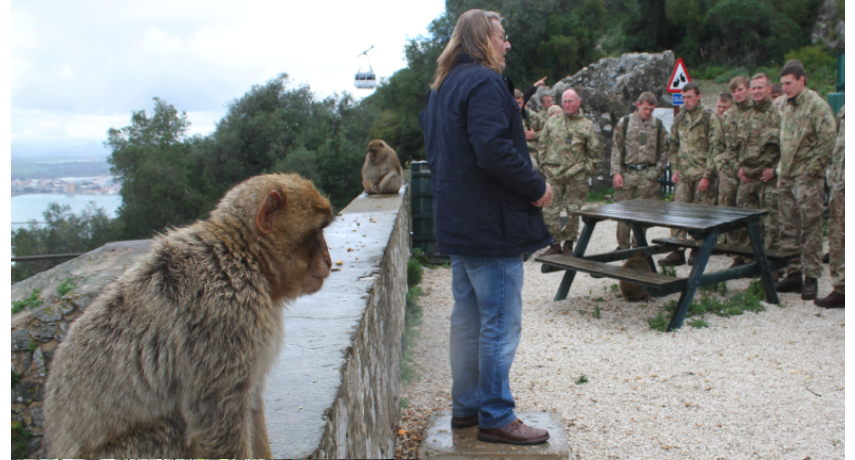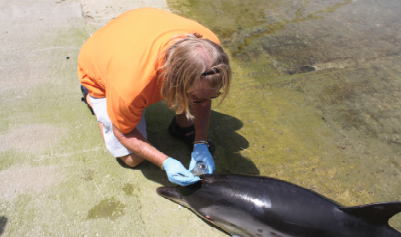Everybody needs a helping hand now and again, but its not just humans that need help, its up to us to protect and conserve our wildlife and natural resources.
Founder of The Helping Hand Trust Dr. Eric Shaw explains how, as a child in Congleton, Cheshire he was always interested in wildlife. “Like most people in those days I did a stint in the military, eventually coming to Gibraltar, and because this place was a paradise for diving back then and because I was a diving instructor and professional diver, when I left the military, I stayed here.”
During the early 1970s when taking groups of members from the joint services on diving expeditions, Eric noticed that when spearfishing in deep waters and around wrecks, some of the fish were up to fifteen or twenty years of age. “Fish are territorial,” Eric says. “When you take fish from inshore waters, especially around Gibraltar, they don’t return.”
Eric realised that the depletion of stocks of fish seemed inevitable and came up with a plan that was ahead of its time. “My idea was to build things under the water to create artificial reefs,” he states. “This wasn’t a new concept because I knew that back in 1888 they were building artificial reefs for the cotton plantation owners on the Mississippi River, and I was also very fortunate to know about the ships that sank during the Second World War.” It was the realisation that these large under water structures were supporting a thriving marine life that led to the formation of the first artificial reef in Europe in Gibraltar waters.
Previous attempts to create an artificial reef from tyres and old cars were, in the long run, unsuccessful, but in 1974 Eric bought for the princely sum of £1 two redundant barges that Gibunco had been using to carry out works at the water intake within the jetty in Camp Bay. In those days it was common practise to dispose of waste such as barges in the sea far out in the Strait, where they would not get in the way of sea traffic. After some research and enquiries, Eric convinced Gibunco to scuttle the gravel filled barges closer to the shoreline at Camp Bay, which they did with the help of many divers. However, during the winter of 1976 and 1977, storms destroyed all the divers’ efforts and after over 700 diving hours had produced little or nothing, an alternative had to be found.
Eric explains they had to re-plan and try to obtain vessels that were surplus to requirements whilst they were still floating and take the divers out of the equation. “What people didn’t understand was that we were doing this for life in the sea, not for divers to explore,” he states. “If someone wanted to get rid of a barge, I was your man.” It wasn’t all plain sailing as the vessels had to be prepared beforehand. “You have to take away all the loose stuff and get rid of it, remove the asbestos, take away the fuel and then fill the vessel with salt water to make the boat heavy.” Navy divers were brought in to cut holes in the decking to let the air out to ensure that the boat would sink quickly.
The Camp Bay site has been added to over the past 40 years by purposefully sinking a number of smaller vessels to create the artificial reef and encourage marine diversity. There are now 11 wrecks in one area, including the 482M, a 100 foot (30 m) long Royal Navy mooring vessel, which sits upright in 56 feet (17 m) of water. “When the MOD offered me the 482 for the reef, I gratefully accepted and told them that I knew where I would like it to be sunk, but that I didn’t have the means or the people to actually sink it,” Eric says. “So with the help of Navy personnel and others who came to help, we had a fantastic sinking.” Eric says that the most memorable part of the day was the sight of hundreds of people on the beach watching the vessel go down. “When I got back down to the beach a young boy came running up to me: “Mister, mister,” he said, “the boat out there – when it drowned did everybody get off?” Eric laughs as he relates this anecdote. “Boats drown as well!” That was in 1999 and 482 was the first MOD vessel to be sunk. “After that things started to take off,” Eric comments. “Where there was just sand before, there is now an oasis of highly diverse marine life.”
There will be many people living in Gibraltar who are either too young or who won’t know about the formation of the artificial reefs. “We are still sinking boats,” Eric says. “I have got two at the present moment waiting to go under water, but we are not here to yell about it, the Helping Hand is here to help protect the sea.”
Passionate about science and research, Eric has always wanted to try and get more people into science, bringing in researchers from universities and colleges from the UK and giving them projects to do, one of which focused on seagrass meadows, something that Eric has produced scientific papers on. “We used to have very good seagrass meadows here, but we destroyed them,” he says. “It was a nursery for all things within the sea itself and every year when pelagic species like sprats and sardines come on to the continental shelf to lay their eggs, they stay in inshore waters until they are big enough to go back to open water.” Explaining that it is very important for these fish to have somewhere to hide, just as they do in wrecks, Eric says that Posidonia, a seagrass species that is endemic to the Mediterranean Sea and critical to the ecosystem, has been killed off. “We want to reintroduce Posidonia in the waters here,” he says gesticulating to the Queensway Quay marina where his office can be found. “All we need to do is control the speed of the vessels so that they don’t disturb the sea bed and cloud it up and create silt, so we are still working on that.”
The Helping Hand Trust was founded in 1994 as a response to the frequency of mutilated dead dolphins being found on the shores of Gibraltar. Eric started to collect data and found that post-mortem markings on the dolphins suggested that they had been caught in fishing nets or lines, but it wasn’t clear who was doing this. The UK media picked up on Eric’s findings and as the news spread worldwide, it was decided to start a charity for the money that was being raised by the newspaper campaigns which then allowed a vessel to be purchased to go out to sea in the Bay and surrounding areas to find out who was responsible for the dolphin mutilations. The charity made it known that they would record all activities with regard to dolphins by taking photographs of the fishing boats and their crews and expose them to the media. The good news is that the dolphins are now mostly saved, evidenced by the fact that they don’t get mutilated anymore. However, together with the assistance of Minister Dr John Cortes, protocols have now been put in place regarding dolphin tours to make sure that the dolphins can live freely and without harassment from boats.
Dr. Shaw is also known to many television viewers as Gibraltar’s Monkey Man, having featured on programmes all around the world. “I have been working with monkeys since the 1980s,” Eric says, “but in the 1990s Gibraltar’s first primatologist Dr. John Fa managed to convince the Government that what we wanted to do was to have a nature reserve, which we do now, but instead Apes Den was created.” Eric and Dr John Fa founded Medambios Environmental Consultants, and turned Queen’s Gate (now Ape’s Den) into a tourist attraction within the MoD restricted area of the Upper Rock, employing five wardens, at least two of whom were on site seven days a week, to guide tourists and stop illegal feeding. Wanting to take people on trips to explain about the monkeys, Eric says that they had calculated it would cost about £80,000. “Although nobody had faith that we could make that money, we convinced ourselves we could, so the Government put up a box at the top of the hill and Helping Hand made £600,000 for them in the first year – all out of 50 pence pieces.”
Back to the present day and the monkeys are currently being monitored and looked after by The Gibraltar Ornithological and Natural History Society (GONHS) and although Eric no longer works with the monkeys, they still have students and researchers contacting them to come out here. “What people have got to understand is that no one owns these monkeys – they are wild – and as long as you are not invasive and don’t touch them, it is a good thing to have students coming here because I am interested in people on the ground sorting out Gibraltar.”
The reason that we need active minds to come in is that, according to Eric, they can ensure the right studies are being done. “I am interested in the rest of the world, but the only thing that I can remain totally focused on is Gibraltar, and for every discipline Gibraltar is such a perfect situation that it doesn’t matter what the study is, you can do it and you can show the rest of the world how it’s done in less than three months, where it will take the rest of the world to find out in three, four or even five years.”
Eric says that there is a huge network both locally and internationally of people who are experts in their own particular field, but the nice thing is that if a primatologist notices that a monkey is eating a new kind of plant, they can immediately put them in touch with people from, for example, Kew Gardens. “We noticed that one of the female monkeys was eating a plant that in the Middle Ages women were using as a contraceptive, so we wondered if it had the same effect, if the female monkey knew to eat it and who told her,” Eric says, going on to say that there is still so much that we don’t know and that we can still learn.
From dolphins, to monkeys and then to bees, something that started by accident when it was noted that bee swarms were exterminated when they were close to populated areas. “Now when swarms are seen we get called by Environmental Health to collect them and re-hive them.”
There is no doubt that Dr. Eric Shaw is providing a helping hand for future generations in their quest to conserve, protect and monitor our natural heritage.
For more information, go to www.helpinghand.gi










